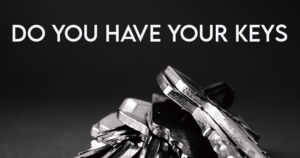The Problem with Passwords
The Problem with Passwords

If you’ve ever locked your keys in your car, you know the feeling of fear and frustration that comes rushing on you. If you you’re like me you walk around the car, kick the tires, and try and figure out how to get your keys.
Once you determine that you are not able to get them yourself, you reluctantly call a locksmith. As you wait for the locksmith to show up, you begin to question how you could be so foolish. You may feel a sense of anger, that turns to a feeling of determination as you resolve to never do that again.
Eventually the locksmith shows up and gets you in your car. You triumphantly take your keys as you hand over $100.00. You begin to devise a grandiose plan on how you will avoid locking your keys in your car. Your plan involves spare keys, hidden keys, unlocking your car from your smart phone, and whatever else sounds good at the time.
After a few seconds these ideas begin to fade, and you remember what you were trying to accomplish in the first place. You start the engine and head on your way.
This same scenario could just as easily unfold with your house keys, or keys at the office. Despite how protective we are of our keys, sometimes we slip up and forget them, or lock them in our car. Even the most careful and paranoid among us, are not immune to mistakes.
Hackers know that everyone is susceptible to making a mistake. All they need is one slip up, and they can gain access to your entire digital life. Remember the fear you felt when you locked your keys in your car?
Now imagine having your password stolen, you bank accounts and your online accounts accessed. In many cases hackers will hijack your account and prevent you from logging in. They will change your password, and even your security questions.
Since most of us, reuse passwords, our accounts aren’t as secure as they could be. Most of us carry our house key and our house key together. If we lose one, we lose the other. If a hacker gains access to one password, it is possible he has access to multiple accounts.
It won’t be long before your credit cards are maxed out, your bank account is drained, and other accounts are opened in your name.
Hackers don’t behave like you see them portrayed in movies or on TV. Hackers are patient, intelligent and highly motivated. They would rather exhaust your resources over time. Numerous small transactions are more attractive than one large transaction. You are less likely to notice a $5 or $20 charge, than you are to notice a $100 or $1000 one.
You need to give the same care and concern with your passwords as you do with your keys. You don’t want anyone to get access to your keys. You also don’t want them to get access to any of your passwords.
Passwords aren’t the problem; you and I are the problem.
Most of us have multiple accounts we need to access. To make life easier we write passwords down, we use the same password for our Netflix account as our work account. In a feeble attempt at security we make weak passwords so that we can remember them.
What security researchers have discovered is that longer passwords are more secure than complex passwords. That isn’t to say abcdefghijklmnopqrstuvwxyz is a secure password. Yes, it is the alphabet, and yes, it is easy to remember, but the alphabet is the first thing hackers are going to try.
A better password is 24Earth!91Rocket* What makes this password better is the use of special characters. The use of numbers and both uppercase and lower-case letters combined with how many characters make this password secure.
A bonus is that this password should be easy to remember. You shouldn’t even have to write the password down in order to quickly recall it.
Now that you have a better understanding of what makes a password secure, you need to learn how to avoid slipping up. Unfortunately, that takes much more time and effort to master.
Security Awareness Training needs to be part of your standard cyber security defense. No one would consider not using anti-virus software, yet most businesses fail to strengthen their largest vulnerability. Human error is the biggest security threat you face. Don’t overlook educating your employees on how to avoid falling victim to online scams.
In addition to Security Awareness Training more businesses are adopting password managers. A good password manager allows your employees to use complex passwords without even knowing what the password is. This helps to lessen human error and reduce risk.
To learn more ways to secure your business call 216-619-2000 opt. 3 or visit www.n2net.com/it-solutions/cyber-security
